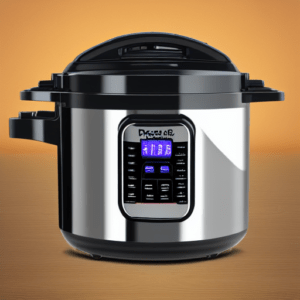Are you wondering which type of pressure cooker is right for you? Stovetop or electric? Check out this article to learn more about the pros and cons of each type of pressure cooker.
What is a pressure cooker?
A pressure cooker is a sealed pot where water or other liquids are cooked at high temperatures, creating steam. This traps the steam inside, which increases the pressure and temperature. The increased pressure and temperature cook food faster than conventional methods. Pressure cookers can be used to cook various types of food, including meat, vegetables, grains, and beans. Pressure cookers are a great way to save time when cooking meals.
Stovetop Pressure Cooker vs. Electric Pressure Cooker
There are two types of pressure cookers: electric and stovetop. Stovetop pressure cookers are the traditional type of pressure cooker and require manual operation. Electric pressure cookers are newer and have many features that make them easier to use, such as automatic shut-off and timers.
Both electric and stovetop pressure cookers have their pros and cons. Some people prefer electric because they are easier to use, while others prefer stovetops because they feel they have more control over the cooking process.
Stovetop Pressure Cooker
A stovetop pressure cooker is a kitchen appliance that cooks food quickly using steam pressure. They can cook various food items, including meats, vegetables, grains, and beans. In addition to cooking food quickly, pressure cookers retain more nutrients than other cooking methods. If you want the traditional cooking experience, a stovetop pressure cooker is the way.

How does the Stovetop pressure cooker work?
Stovetop pressure cookers work by using steam pressure to cook food. The cooker has a sealed chamber that traps steam inside. The steam builds up pressure, which raises the temperature inside the chamber and cooks the food.
Most stovetop pressure cookers weight the top that regulates the amount of steam that can escape. As the steam escapes, it cools down the pot and prevents the food from overcooking.
Benefits of Stovetop pressure cooker
Stovetop pressure cookers have been around for much longer than electric pressure cookers and offer several benefits.
- Stovetop pressure cookers are less expensive than electric pressure cookers.
- They cook food faster compared to other cooking methods.
- They are also more energy efficient because they can be used on any stove.
- They are also easier to control than electric pressure cookers.
- They also tend to be more durable and offer more control over the cooking process.
Drawbacks of Stovetop pressure cooker
Stovetop pressure cookers have a few drawbacks when compared to electric pressure cookers.
- They generally require more time to come up to pressure and then release that pressure.
- Another downside of these cookers is that they can be quite loud.
- They can be quite dangerous. If not used correctly
Electric Pressure Cooker
An electric pressure cooker is a kitchen appliance that uses electricity to cook food under high pressure. It is also known as an e-pressure cooker or an electronic pressure cooker. Electric pressure cookers are more energy-efficient than stovetop models and can be used to cook food faster.

How does Electric Pressure Cooker work?
Electric pressure cookers use a heating element to bring water to a boil, which creates steam. The steam builds pressure inside the pot, which cooks the food more quickly. The pressure is released when the cooking is finished, allowing the food to be safely removed from the pot.
Electric pressure cookers are available in various sizes and with different features. Some have timers and automatic shut-off functions, while others have programmable settings for different types of food.
Benefits of Electric Pressure Cooker
Electric pressure cookers offer several advantages over their stovetop counterparts.
- They free up a burner on your stove, making them ideal for large gatherings or holiday meals.
- They can be set to cook at a lower temperature than a stovetop pressure cooker.
- They have built-in timers so you can set and forget them.
- If you read the instructions carefully, they are easier to use than stovetop models.
- They’re also much safer since there’s no risk of an explosion.
Drawbacks of Electric Pressure Cooker
Electric pressure cookers have several drawbacks when compared to stovetop models.
- They can be more expensive.
- They are slower than the stovetop models
- They often have shorter warranties.
- They can be more difficult to use, especially for those new to pressure cooking.
Which is better? Stovetop or electric?
When it comes to electric pressure cookers vs stovetop pressure cookers, it depends on what you’re looking for and your needs. Stovetop models are less expensive, more energy efficient, and easier to control. Electric models are more expensive but offer some features that stovetop models don’t, like the ability to set a timer and walk away.
If you want an easy to use pressure cooker that doesn’t require much supervision, then an electric pressure cooker is probably the way to go. On the other hand, if you want a pressure cooker that is more hands-on and allows you more control over the cooking process, then a stovetop pressure cooker might be a better option.
If you’re looking for a pressure cooker on a budget, a stovetop model is your best bet. You can find them for as little as 2000 rs. They’re also more energy efficient than electric models since they only use the heat from the stove to operate.







